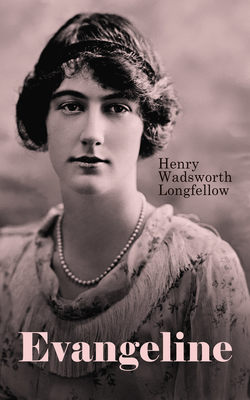Читать книгу Evangeline: A Tale of Acadie - Генри Уодсуорт Лонгфелло - Страница 5
На сайте Литреса книга снята с продажи.
III.
ОглавлениеTable of Contents
BENT like a laboring oar, that toils in the surf of the ocean,
Bent, but not broken, by age was the form of the notary public;
Shocks of yellow hair, like the silken floss of the maize, hung
Over his shoulders; his forehead was high; and glasses with horn bows
Sat astride on his nose, with a look of wisdom supernal.
Father of twenty children was he, and more than a hundred
Children's children rode on his knee, and heard his great watch tick.
Four long years in the times of the war had he languished a captive,
Suffering much in an old French fort as the friend of the English.
Now, though warier grown, without all guile or suspicion,
Ripe in wisdom was he, but patient, and simple, and childlike.
He was beloved by all, and most of all by the children;
For he told them tales of the Loup-garou in the forest,
And of the goblin that came in the night to water the horses,
And of the white Létiche, the ghost of a child who unchristened
Died, and was doomed to haunt unseen the chambers of children;
And how on Christmas eve the oxen talked in the stable,
And how the fever was cured by a spider shut up in a nutshell,
And of the marvellous powers of four-leaved clover and horseshoes,
With whatsoever else was writ in the lore of the village.
Then up rose from his seat by the fireside Basil the blacksmith,
Knocked from his pipe the ashes, and slowly extending his right hand,
"Father Leblanc," he exclaimed, "thou hast heard the talk in the village,
And, perchance, canst tell us some news of these ships and their errand."
Then with modest demeanor made answer the notary public:—
"Gossip enough have I heard, in sooth, yet am never the wiser;
And what their errand may be I know not better than others.
Yet am I not of those who imagine some evil intention
Brings them here, for we are at peace; and why then molest us?"
"God's name!" shouted the hasty and somewhat irascible blacksmith;
"Must we in all things look for the how, and the why, and the wherefore?
Daily injustice is done, and might is the right of the strongest!"
But, without heeding his warmth, continued the notary public:—
"Man is unjust, but God is just; and finally justice
Triumphs; and well I remember a story, that often consoled me,
When as a captive I lay in the old French fort at Port Royal."
This was the old man's favorite tale, and he loved to repeat it
When his neighbors complained that any injustice was done them.
"Once in an ancient city, whose name I no longer remember,
Raised aloft on a column, a brazen statue of Justice
Stood in the public square, upholding the scales in its left hand,
And in its right a sword, as an emblem that justice presided
Over the laws of the land, and the hearts and homes of the people.
Even the birds had built their nests in the scales of the balance,
Having no fear of the sword that flashed in the sunshine above them.
But in the course of time the laws of the land were corrupted;
Might took the place of right, and the weak were oppressed, and the mighty
Ruled with an iron rod. Then it chanced in a nobleman's palace
That a necklace of pearls was lost, and erelong a suspicion
Fell on an orphan girl who lived as maid in the household.
She, after form of trial condemned to die on the scaffold,
Patiently met her doom at the foot of the statue of Justice.
As to her Father in heaven her innocent spirit ascended,
Lo! o'er the city a tempest rose; and the bolts of the thunder
Smote the statue of bronze, and hurled in wrath from its left hand
Down on the pavement below the clattering scales of the balance,
And in the hollow thereof was found the nest of a magpie,
Into whose clay-built walls the necklace of pearls was inwoven."
Silenced, but not convinced, when the story was ended, the blacksmith
Stood like a man who fain would speak, but findeth no language;
All his thoughts were congealed into lines on his face, as the vapors
Freeze in fantastic shapes on the window-panes in the winter.
Then Evangeline lighted the brazen lamp on the table,
Filled, till it overflowed, the pewter tankard with home-brewed
Nut-brown ale, that was famed for its strength in the village of Grand-Pré;
While from his pocket the notary drew his papers and inkhorn,
Wrote with a steady hand the date and the age of the parties,
Naming the dower of the bride in flocks of sheep and in cattle.
Orderly all things proceeded, and duly and well were completed,
And the great seal of the law was set like a sun on the margin.
Then from his leathern pouch the farmer threw on the table
